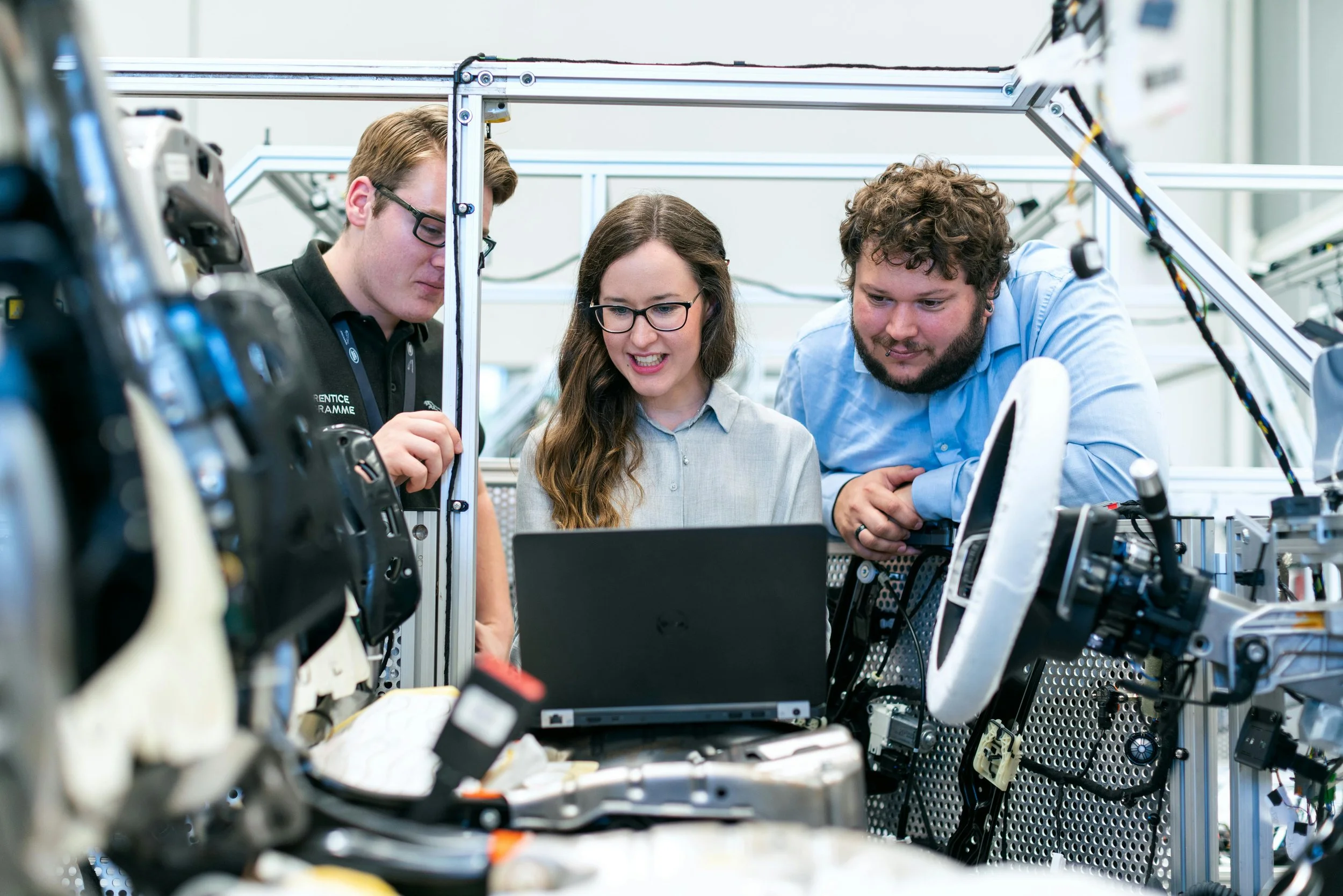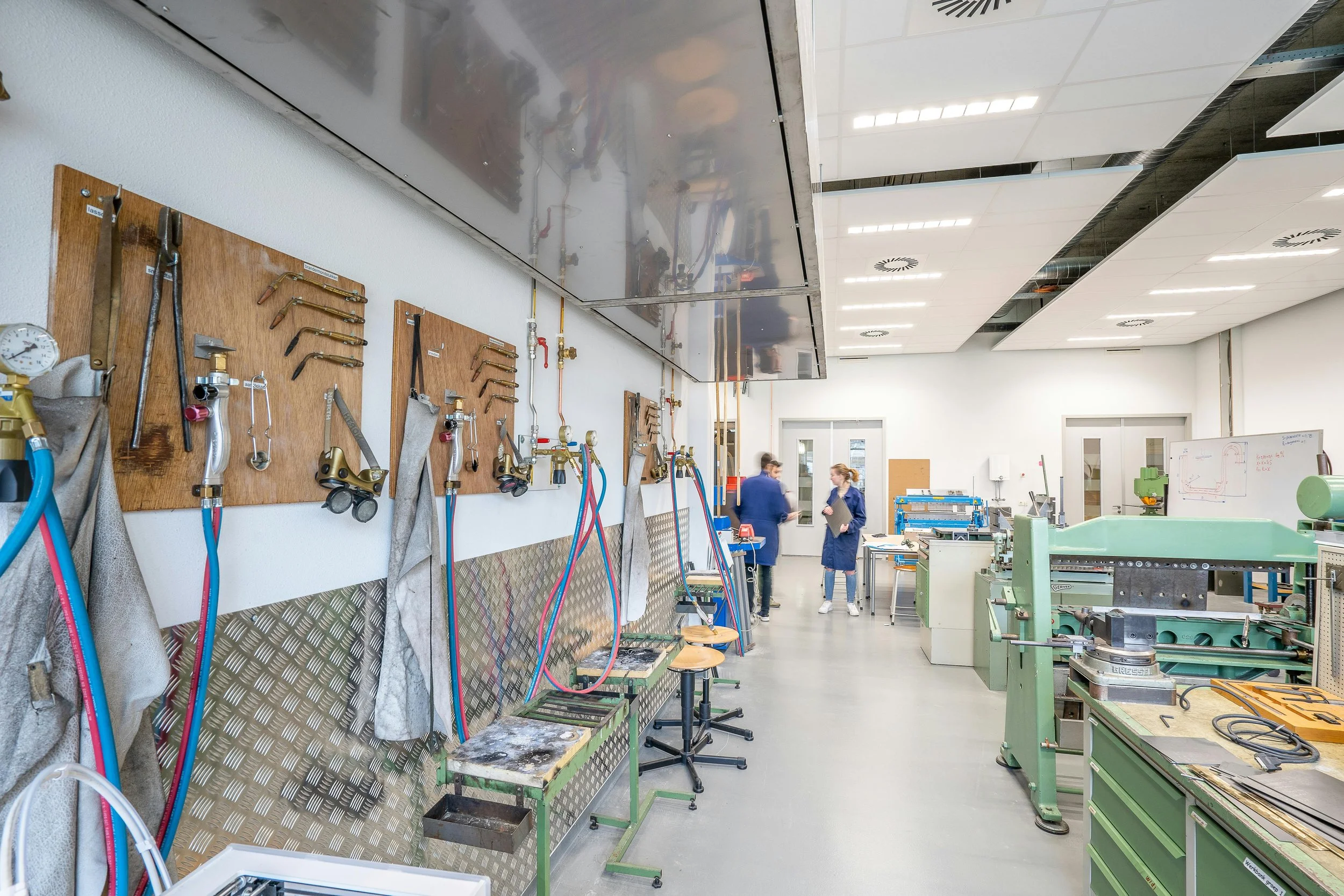Which Type of Engineering Degree Is Right for You? A Guide to Engineering Majors—from Aerospace to Mechanical to Biomedical
Many students who love math and science wonder: Should I study engineering—and if so, what kind? Each engineering field attracts a different kind of thinker and problem-solver, from hands-on builders to abstract analysts—and the differences can be hard to see from the outside.
At Lantern College Counseling, we help students move beyond majors and requirements to understand how they like to think and what kinds of problems they most want to solve.
Drawing on my experience as a Dean of Engineering of a highly competitive university and 18 years working in higher education engineering admissions, as well as my own academic background—earning a B.S. in Electrical Engineering from Johns Hopkins and both M.S. and Ph.D. degrees in Electrical and Computer Engineering from Carnegie Mellon University—I bring an insider’s view of how highly selective engineering programs are designed—and how admissions committees evaluate students who will thrive in them. For a deeper look at that perspective, see see From Wellesley to MIT and Olin: Insider College Admissions Counseling from a Former Admissions Officer.
Over the course of my career, I’ve helped thousands of students decide which engineering path best fits their interests, learning styles, and long-term goals. This isn’t just a list of “top engineering majors” or “degrees with the highest salaries.” Instead, I share strategies for how to identify programs that align with your individual strengths and ambitions using our Deep-Fit™ admissions approach as a guide so you can make confident, well-informed decisions about your future.
You don’t have to have it all figured out. We can help you discover which engineering major fits — and at which engineering college you’ll thrive.
Table of Contents
How to Explore Engineering in High School Through Extracurricular Activities and Classes
15 Types of Engineering Majors (and Who Thrives in Each)
Engineering vs. Engineering Technology: What’s the Difference?
What Are the Job Prospects and Career Pathways in Engineering?
What Do Engineers Actually Do?
Engineering is about solving problems—turning ideas into reality through design, experimentation, and iteration. Engineers use math and science not just to understand how things work, but to create solutions that improve how people live and interact with the world.
From developing renewable-energy systems to designing medical devices, from building bridges to programming autonomous vehicles, engineers combine creativity, logic, and persistence to make complex systems work. The most successful engineers aren’t just technical experts; they’re curious, collaborative thinkers who enjoy learning how things connect.
Engineering today also looks very different from what it did a generation ago. Many of the fastest-growing fields—such as robotics, sustainability engineering, biomedical innovation, and human-centered design—are interdisciplinary, blending technology and the liberal arts, a shift explored further in our article How Liberal Arts Engineering Prepares Students for an AI Future. This means there’s more room than ever for students to find a path that matches both their strengths and their values.
Understanding this mindset early helps you recognize whether you naturally think like an engineer—curious, persistent, and driven to improve systems.
Your interests are the starting point. We’ll help you turn them into direction.
How to Explore Engineering in High School Through Extracurricular Activities and Classes
If you’re curious about engineering but not sure where to start, you don’t have to wait until college to explore it. High school offers many ways to experience what engineers actually do—whether you’re a hands-on builder, a creative designer, or a problem-solver who loves math and logic.
If you’re not sure where to begin, see What Extracurricular Activities Matter Most—and How We Help Students Find Them for ideas on how to explore your interests authentically and discover what truly excites you before choosing courses or clubs.
There are many ways to begin exploring—some as simple as joining a club or experimenting with a project at home:
Join a robotics, engineering, or science club.
Take a computer science or CAD course, or try an online design challenge.
Attend a summer engineering or STEM program.
Participate in maker fairs, hackathons, or sustainability projects.
Shadow an engineer or visit a local company or university lab.
For more guidance on which high school classes will best prepare you for engineering or computer science majors, see What Classes Should You Take If You Are Applying for an Engineering or Computer Science Major in College.
Exposure to real-world problem solving helps you discover which kinds of engineering feel most natural and exciting—and it strengthens your future college applications along the way.
Discovering what excites you early makes your college choices far more intentional—and far more aligned with who you are.
When we work with high school students at Lantern, we often start with a simple question:
“What kinds of problems do you most want to solve?”
That curiosity becomes the compass for exploring the different branches of engineering—and the foundation for discovering your own Deep-Fit path. Once you understand what draws you in—whether it’s protecting the environment, designing smarter technology, or building structures that last—you can begin to see which type of engineering aligns with your natural interests and the way you think best.
Not sure which kind of engineering fits you best?
15 Types of Engineering Majors (and Who Thrives in Each)
Each engineering major or field attracts a different kind of thinker, problem-solver, or creator. Exploring how they differ can help you discover where your curiosity—and your potential—fit best.
Below, you’ll find an overview of the major types of engineering degrees and college programs—what they involve, the kinds of thinkers they attract, and the college majors that connect to each field.
Mechanical Engineering
What is Mechanical Engineering? Mechanical engineers design and test physical systems—everything from robots and vehicles to wind turbines and prosthetic limbs. It’s one of the broadest and most versatile engineering fields, offering strong foundations for careers in design, manufacturing, energy, and beyond.
You might love this major if: You’re endlessly curious about how things move or work. You enjoy tinkering, building, or taking things apart just to see what’s inside.
You might be good at this if: You’re strong in physics and math, especially when it comes to motion, energy, and design. You like turning abstract ideas into tangible prototypes.
Explore college majors and degree programs like: Mechanical Engineering, Mechatronics, Robotics
For insight on how mechanical engineering programs vary and how to evaluate fit beyond rankings, see Best Colleges for Mechanical Engineering: How to Find the Right Fit Beyond the Rankings.
Aerospace Engineering
What is Aerospace Engineering? Aerospace engineers design and analyze aircraft, spacecraft, satellites, and propulsion systems. The field combines physics, materials science, and systems thinking—and it’s ideal for students who enjoy both creative problem-solving and rigorous analysis.
You might love this if: You’ve always been fascinated by flight, space, or the challenge of pushing technology to new limits.
You might be good at this if: You have strong math and physics skills and like solving complex, multivariable problems. You enjoy both precision and imagination.
Explore college majors and degree programs like: Aerospace Engineering, Aeronautical Engineering, Astronautical Engineering
For a deeper look at how top and underrated programs compare, see Best Colleges for Aerospace Engineering.
Electrical Engineering
What is Electrical Engineering? Electrical engineers design and manage the flow of power and information. They work on renewable-energy systems, microelectronics, telecommunications, and robotics control systems. The field appeals to analytical thinkers who like making invisible systems work seamlessly.
You might love this if: You’re fascinated by how electricity, signals, and systems power the world—from the circuits in everyday devices to the networks that connect satellites in space.
You might be good at this if: You enjoy math and physics, especially circuits, waves, and problem-solving that involves abstract thinking and logic.
Explore college majors and degree programs like: Electrical Engineering, Power Systems, Electronics Engineering
Computer Engineering
What is Computer Engineering? Computer engineers bridge the gap between electrical engineering and computer science. They design microprocessors, embedded systems, sensors, and smart devices—and often collaborate with software developers to bring technology to life.
You might love this if: You think like a builder and problem-solver, fascinated by how hardware and software interact.
You might be good at this if: You enjoy both coding and circuitry, and like using logic to make physical systems “think.”
To gain insight into how undergraduate computer engineering programs differ and how to evaluate fit beyond rankings, see Best Colleges for Computer Engineering: How to Find the Right Fit Beyond the Rankings.
Explore college majors and degree programs like: Computer Engineering, Embedded Systems, Hardware Design
Computer Science
What is Computer Science? Computer science focuses on algorithms (“numerical recipes”), programming, and data—how information is stored, processed, and applied. CS majors might build apps, study artificial intelligence, analyze data, or explore cybersecurity. It’s a great fit for students who love creativity through logic and design.
You might love this if: You enjoy solving puzzles, writing code, or designing systems that make technology smarter and more human.
You might be good at this if: You’re strong in logic and abstract reasoning, enjoy problem-solving, and like learning new programming languages or algorithms.
Explore college majors and degree programs like: Computer Science, Data Science, Artificial Intelligence, Software Engineering
For more on the evolving value of this degree, see Is a Computer Science Degree Still Worth It in 2025?
To understand how to present your CS interests effectively in applications, see The College Application Process for Computer Science (CS) Majors.
Artificial Intelligence
What is Artificial Intelligence? AI majors focus on machine learning, data science, and human-computer interaction—building systems that can perceive, reason, and adapt. Many programs overlap with computer science but add coursework in statistics, cognitive science, and ethics. Students often pursue careers in automation, data analytics, or AI-driven design.
You might love this if: You’re fascinated by how machines learn, make decisions, or generate creative solutions.
You might be good at this if: You enjoy logic, pattern recognition, and working with data to train or refine intelligent systems.
Explore college majors and degree programs like: Artificial Intelligence, Machine Learning, Data Science, Cognitive Systems
For a deeper look at what these programs include and which colleges offer them, see Best Colleges for Artificial Intelligence (AI) Majors.
Biomedical Engineering
If you're not sure which type of engineering to major in--or which college would be the best fit for your interests & needs--
What is Biomedical Engineering? Biomedical engineers create medical devices, prosthetics, imaging tools, and healthcare innovations. The field blends engineering design with biology and chemistry—and often involves collaboration with physicians and researchers.
You might love this if: You’re drawn to both science and medicine and want to use technology to improve human health.
You might be good at this if: You’re strong in biology and physics and like open-ended problems that connect technology and the human body.
Explore college majors and degree programs like: Biomedical Engineering, Bioengineering, Biomechanical Engineering
Civil Engineering
What is Civil Engineering? Civil engineers design and maintain the infrastructure that keeps communities functioning—roads, bridges, buildings, and water systems. They balance creativity with precision, often working at the intersection of design, construction, and sustainability.
You might love this if: You’re fascinated by how cities, bridges, and buildings come to life—and how design can shape the way people live and move.
You might be good at this if: You enjoy geometry, physics, and visualizing structures in space. You like tangible, real-world projects with visible results.
Explore college majors and degree programs like: Civil Engineering, Structural Engineering, Architectural Engineering
Ocean Engineering
What is Ocean Engineering? Ocean engineers design and build systems that operate in the ocean environment—from offshore wind farms and underwater vehicles to coastal structures and wave-energy converters. The field combines principles of mechanical, civil, and environmental engineering with oceanography and materials science to solve challenges related to marine technology, sustainability, and climate resilience.
You might love this major if: You’re fascinated by the ocean, renewable energy, or how technology can interact safely and sustainably with the natural world. You enjoy projects that connect engineering with environmental stewardship.
You might be good at this if: You’re strong in math, physics, and design, and you like thinking about how structures perform in dynamic, real-world conditions like waves, pressure, and corrosion.
Explore college majors and degree programs like: Ocean Engineering, Naval Architecture and Marine Engineering, Coastal Engineering, Marine Systems Engineering
Environmental Engineering
What is Environmental Engineering? Environmental engineers apply science and design to solve problems like clean-water access, pollution control, and renewable energy. It’s an ideal path for students passionate about sustainability and real-world impact.
You might love this if: You care deeply about protecting the planet and want to design technologies that support sustainable living.
You might be good at this if: You enjoy environmental science, chemistry, and systems thinking, and like solving global-scale challenges.
Explore college majors and degree programs like: Environmental Engineering, Sustainability Engineering, Water Resources Engineering
Chemical Engineering
What is Chemical Engineering? Chemical engineers use chemistry and math to design large-scale systems that create fuels, pharmaceuticals, and sustainable materials. They translate lab discoveries into products that can be produced safely and efficiently.
You might love this if: You’re fascinated by chemistry and want to turn lab concepts into real-world innovations.
You might be good at this if: You’re strong in chemistry, physics, and calculus, and enjoy designing processes that turn raw materials into useful products.
Explore college majors and degree programs like: Chemical Engineering, Process Engineering, Biochemical Engineering, Chemical and Biological Engineering
Materials Engineering
What is Materials Engineering? Materials engineers study and develop substances with specific properties—stronger alloys, lighter composites, smarter textiles, and semiconductors. They work across industries including electronics, aerospace, and sustainability.
You might love this if: You’re fascinated by what things are made of—and how materials shape innovation, from solar panels to medical implants.
You might be good at this if: You like physics and chemistry and enjoy experimenting with structure, strength, and new applications of matter.
Explore college majors and degree programs like: Materials Engineering, Metallurgical Engineering, Nanomaterials Science
Systems Engineering
What is Systems Engineering? Systems engineers design, coordinate, and optimize complex projects—like spacecraft, transportation networks, or defense systems. They ensure every component works together effectively and efficiently.
You might love this if: You’re a big-picture thinker who enjoys seeing how many moving parts fit together.
You might be good at this if: You’re strong in math, organization, and analysis, and enjoy balancing technical detail with strategic planning.
Explore college majors and degree programs like: Systems Engineering, Systems Design, Engineering Management
Industrial Engineering
What is Industrial Engineering? Industrial engineers analyze processes in manufacturing, logistics, and service industries to reduce waste and improve performance. They combine math, data analysis, and human-factors design to make organizations more effective.
You might love this if: You like making things work better—faster, safer, and more efficiently.
You might be good at this if: You enjoy math, statistics, and process improvement, and like figuring out how people, technology, and systems interact.
Explore college majors and degree programs like: Industrial Engineering, Operations Research, Manufacturing Engineering
Emerging and Interdisciplinary Fields
What are emerging and interdisciplinary engineering majors? New fields such as sustainability engineering, human-centered design, robotics, and liberal-arts engineering reflect the growing need for flexible, creative problem-solvers. These programs often emphasize collaboration, ethics, and innovation—and increasingly focus on how humans interact with technology through areas like Human Factors Engineering and Engineering Psychology.
You might love this if: You’re curious about how technology connects across fields—and you want a career that blends disciplines.
You might be good at this if: You thrive when combining creativity with analytical thinking and like exploring new, evolving areas of study.
Explore college majors and degree programs like: Engineering Science, General Engineering, Human-Centered Design, Robotics, Human Factors Engineering, Engineering Psychology, or interdisciplinary programs
Deciding which engineering major or degree program fits you best often depends on how you like to approach problems. Some students love building tangible systems—motors, sensors, robots—while others thrive in the abstract world of code, models, and algorithms. Taking time to notice what feels most natural can help you identify your best-fit engineering major—and, just as importantly, the college environments where you’ll learn best.
Find the engineering environment where you’ll learn — and thrive.
What to Look for in a College Engineering Program
Choosing the right college for engineering is about far more than rankings or prestige. The best program is the one that fits how you learn, what you value, and how ready you are to specialize.That’s why many students thrive at engineering programs that don’t always appear at the top of rankings but excel at undergraduate teaching, mentorship, and hands-on preparation—something I explore in Underrated Engineering Colleges: Exceptional Programs Beyond the Rankings.
Some students know exactly which field they want to pursue. Others are still exploring—or even wondering whether engineering is the right path at all. Both starting points are completely valid.
Ultimately, your goal isn’t just to get into an engineering school—it’s to find the one where your curiosity, motivation, and learning style align. That’s your Deep-Fit.
Colleges vs. Universities: How the Structure Shapes Your Experience
In the U.S., “college” and “university” are often used interchangeably, but the distinction matters—especially in engineering.
Colleges typically focus on undergraduate education. They’re smaller, more teaching-oriented, and tend to offer closer faculty mentorship.
Universities are larger and more research-driven. They often have multiple schools—such as a School of Engineering and a School of Arts & Sciences—and may admit students directly into a specific major or division.
At smaller colleges, you’re more likely to be taught by professors rather than graduate students and enjoy a more personal, hands-on experience. At large research universities, you’ll find a broader range of labs, majors, and research opportunities.
For students considering whether a smaller, teaching-centered environment might better support how they learn, see Small Colleges to Study Engineering: Why Size Isn’t a Disadvantage, which explores why many undergraduate engineers thrive at smaller institutions.
For a deeper look at how these structural differences shape the student experience, see University vs. College: What’s the Difference and How it Impacts the Student Experience.
Hands-On or Theoretical? Know Your Learning Style
Engineering programs vary widely in how they teach. Some are hands-on and project-based, immersing students in design-build experiences from day one. Others take a more theoretical approach, emphasizing proofs and problem sets before moving to applications.
As Lantern founder Jennifer Stephan, Ph.D., notes from her own engineering journey—earning a B.S. in Electrical Engineering from Johns Hopkins and both M.S. and Ph.D. degrees in Electrical and Computer Engineering from Carnegie Mellon University—each style builds a different type of thinker:
“At Hopkins, I learned to prove things. At CMU, I learned to build them.”
That contrast captures one of the most important insights for future engineers: how you learn matters just as much as what you learn.
I never worked as a practicing engineer, but the way I learned to think as one still shapes how I approach complex problems. Breaking big challenges into smaller, manageable parts—and solving them step by step—remains central to all my work, including how I guide students through the college search.
When considering where you’ll thrive, ask yourself:
Do I learn best by doing or by analyzing?
Do I want to build physical prototypes, or do I prefer modeling and simulation?
Do I want to work in a maker space, or would I rather dive deep into algorithms and theory?
Understanding your learning style helps you identify colleges where the curriculum, teaching philosophy, and campus resources align with your natural approach to problem-solving—and, ultimately, with your long-term success in engineering.
Does the College Program include Flexibility for Exploration?
If you’re not yet sure which type of engineering—or even whether engineering is right for you—prioritize programs with built-in flexibility. Many colleges recognize that students refine their goals over time and design pathways that allow exploration before committing.
Look for undeclared or general engineering options, as well as cross-registration or easy internal transfer between majors or schools. Colleges that encourage this kind of discovery help students find their best Deep-Fit before locking into a specific path.
For examples of colleges that make exploration easier—and to see how this flexibility supports long-term success—see Illuminating Your Path to an Engineering Major and Career and Navigating the College Search for the Undecided STEM Student.
Match the Engineering Curriculum to Your Strengths and Interests
Each engineering discipline emphasizes different core skills—and understanding these differences early can help you choose a major that plays to your strengths. Electrical Engineering tends to be the most math-intensive; Chemical and Biological Engineering require significant chemistry; and Mechanical Engineering draws heavily on physics.
Before committing to a major, review each program’s curriculum:
• Are you genuinely excited by the required courses?
• Do the math and science expectations align with your strengths?
• Does the program’s structure leave room for your other interests—like business, design, or the liberal arts?
Engineering Co-ops, Internships, and Real-World Experience
Hands-on learning outside the classroom can make all the difference. Schools like Northeastern, Drexel, and the University of Cincinnati build co-op programs directly into their degrees, allowing students to alternate between coursework and paid, full-time work experience.
These programs don’t just strengthen résumés—they help students test their interests in real-world settings and build professional confidence long before graduation. Internships, research assistantships, and project-based learning offer similar benefits, especially at smaller colleges where close faculty mentorship is the norm.
If you’re comparing programs, ask yourself:
• How accessible are internships or co-ops for first-year or second-year students?
• Are they optional or required?
• Does the program have dedicated staff or partnerships to help students find placements?
For students deciding between research-oriented and career-oriented programs, experiential learning can be a powerful differentiator.
Do I Need an ABET-Accredited Engineering Program?
If you’re pursuing a traditional engineering path, look for programs that are ABET-accredited, which ensures they meet rigorous national standards for engineering education and professional licensure. ABET accreditation can be especially important if you plan to become a licensed Professional Engineer (PE) or enter fields like civil or mechanical engineering where certification matters.
However, ABET accreditation isn’t essential for every student. Some programs offer an extraordinary engineering education even without formal accreditation.
For a deeper explanation of what ABET accreditation means and when it matters, see For Aspiring Engineers: Understanding the Value of ABET Accreditation.
You don’t need all the answers yet. Just the right guidance to ask the right questions.
Engineering vs. Engineering Technology: What’s the Difference?
Families often notice that some colleges offer both Engineering and Engineering Technology programs—and wonder which one is the better fit. The answer depends on your learning style and long-term career goals.
Engineering degrees (such as Mechanical, Electrical, or Civil Engineering) emphasize theory, design, and advanced mathematics. Students learn to analyze systems, model complex problems, and design or lead the development of new technologies. These programs typically prepare graduates for professional engineering licensure (PE) and for graduate study in engineering or related fields.
Engineering Technology degrees, by contrast, focus on application and implementation. Students learn to apply engineering principles to operate, test, and improve existing systems. The coursework tends to be more hands-on and less math-intensive, emphasizing labs, manufacturing processes, and technical operations.
Both paths can lead to rewarding careers—but they differ in focus:
• Engineering: Design, research, innovation, and theoretical analysis
• Engineering Technology: Implementation, testing, operations, and production management
For students who learn best by doing, or who want to move directly into applied industry work after college, Engineering Technology can be an excellent option.
For those drawn to design, analysis, or graduate-level research, traditional engineering programs are often the stronger choice.
The best engineering programs give you the tools, mentorship, and experiences to design solutions that matter. We’ll help you find the programs that are your Deep-Fit.
FAQs
Which Engineering Major is the Most Math-Heavy?
Electrical Engineering is the most math-intensive major, focusing on advanced concepts in systems, signals, and electromagnetics. Aerospace and Mechanical Engineering follow closely. Students who enjoy tackling complex, quantitative problems tend to thrive in these fields.
What’s the Difference Between Computer Engineering and Computer Science?
Computer Engineering blends hardware and software, focusing on how circuits and code work together. Computer Science emphasizes algorithms, data structures, and software systems—ideal for students who enjoy abstract problem-solving.
What if I’m Not Sure Which Engineering Field I Want? Can I Major in “Undecided Engineering”?
Many colleges let students explore before choosing a major. Look for programs that encourage discovery through general engineering options or flexible first-year curricula.
Are Co-ops Worth it?
Absolutely. Structured co-op programs, like those at Northeastern, Drexel, and the University of Cincinnati, allow students to gain paid, real-world experience while earning their degree. Many graduates receive full-time offers from their co-op employers.
Get expert guidance for planning your engineering career.
What Are the Job Prospects and Career Pathways in Engineering?
Engineering continues to offer one of the most versatile and future-proof career foundations of any major. Graduates are in demand across a wide range of industries — from aerospace, robotics, and renewable energy to data science, healthcare, and infrastructure — and many roles offer strong entry-level salaries with significant long-term growth potential. Every engineering degree opens multiple doors, whether you want to design cutting-edge technology, lead complex systems, or apply analytical skills in business, policy, or research.
Mechanical and Electrical Engineers often move into fields such as robotics, renewable energy, aerospace, and advanced manufacturing. (For an inspiring look at how an engineering education can lead to groundbreaking innovation, see Preparing for an Engineering Career: A Conversation with Dr. Rob Playter, CEO of Boston Dynamics.)
Biomedical Engineers bridge technology and medicine, developing devices, diagnostics, and digital health solutions.
Civil and Environmental Engineers lead sustainability efforts and design resilient infrastructure for a changing climate.
Computer and Systems Engineers drive progress in automation, artificial intelligence, and data systems—fields where innovation and adaptability are key.
Many engineers also use their analytical training as a launchpad for graduate study in business, data science, policy, or law—applying engineering thinking across disciplines and industries.
No matter which path you choose, an engineering degree builds evergreen skills — from systems thinking to creative problem-solving — that keep you in demand across industries and position you for strong career prospects and advancement over the long term.
Finding Your Best-Fit Engineering Program
If there’s one thing we’ve learned from guiding thousands of STEM-interested students, it’s that engineering isn’t a single path—it’s a mindset. Engineers ask questions, test possibilities, and design better systems. Some are analytical, some creative, some hands-on, and some deeply theoretical. What unites them is curiosity and a drive to make things work better.
Through Lantern’s Deep-Fit process and reflective tools like our Passion Discovery Workbook, we help students uncover what that means for them—aligning their interests, learning styles, and environments for long-term success. Together, we explore three key questions:
What kinds of problems do you most want to solve?
How do you like to learn and think?
What kind of environment helps you grow?
When those answers align with the right major and college setting, students don’t just gain admission—they thrive once they get there.
Maybe you already have a clear direction like Kyle, who pursued chemical engineering after internships and AP coursework. Or you’re like William, who explored computer science, electrical, and computer engineering before finding his focus. Or Elizabeth, who began in biology and discovered biomedical engineering once she experienced it firsthand. Each story is a reminder that there isn’t one “correct” path—only the one that fits you.
Deep-Fit means alignment—between your mind, your motivation, and your environment. Whether you’re captivated by renewable energy, robotics, medicine, or the built environment, the right engineering path will energize you, challenge you, and keep you curious.
Although I didn’t pursue a traditional engineering career, the way I learned to approach complexity—by breaking big problems into smaller, solvable parts—still defines how I work. That same structured, problem-solving mindset underpins how we help students transform the college search from overwhelming to achievable and shapes the way we connect with students. Learn more in our article Expert College Counseling for Your STEM Student — From Two Engineers Who Speak Geek.
Drawing on my experience as an engineer, former CS professor, and Dean of Engineering, I founded Lantern College Counseling to help students find not just the right college—but the environment where they will truly thrive. For a look at how our collaborative team supports students throughout the search process, see Partnering with High School Students on the College Search: How Our College Counseling Team Helps Students Find the Best-Fit College.
If you’re ready to turn that clarity into action, see our complete guide to engineering college admissions.
We'll help you find the best engineering programs for your specific needs, skills and goals.










